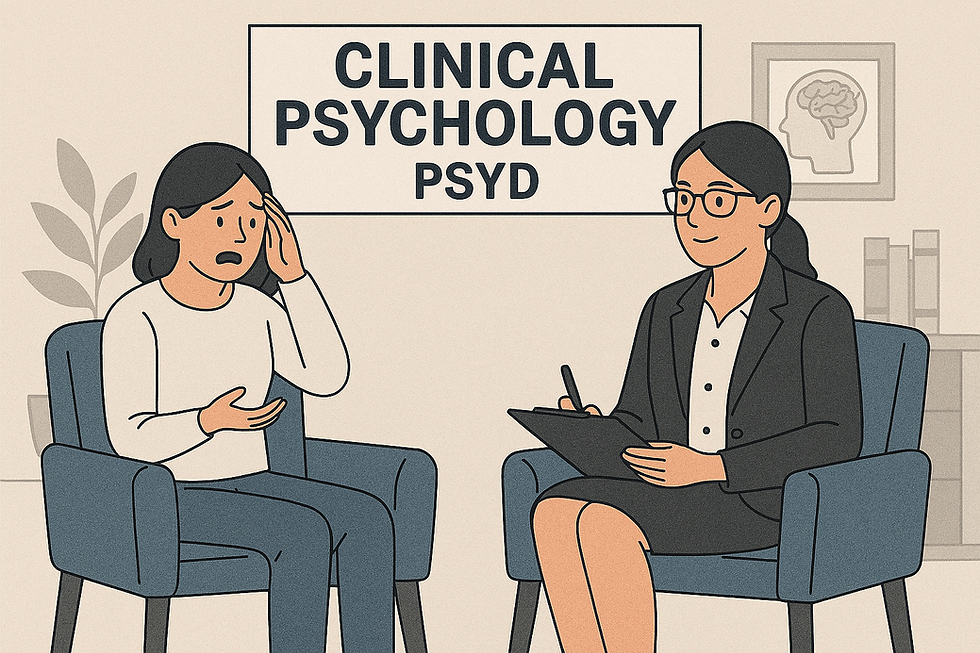PsyD Clinical Psychology Personal Statement
- Robert Edinger
- Sep 18, 2025
- 3 min read

The Doctor of Clinical Psychology at ____ is my first choice among doctoral programs because of the way that I share the mission of your institution and as well as its vision. I long for the opportunity learn directly from renowned clinicians and researchers such as Professor ____ ____, a pioneer in Neuropsychology, since I deeply admire his groundbreaking work in the areas of consciousness, executive function, and memory – all of which stand at the centre of my professional interests. I also keenly look forward to studying under Professor ____ ____ and learning as much as I can about assessment and the treatment of psychogenic, non-epileptic seizures and functional movement disorders, broadening and strengthening my grasp of Pediatric Neuropsychology
My education and clinical experience in both the UK and my native Saudi Arabia have provided me with a solid, interdisciplinary foundation in Psychology. Immersing myself in the clinical community at King Fahad Specialist Hospital in Dammam (KFSH-D) has confirmed my special passion for neurologically impaired patients. Neurological disorders - especially epilepsy and stroke - have now been my primary focus for some time. I am especially grateful to have had the experience of serving on multidisciplinary, Epilepsy and Rehabilitation teams, further enhancing my grasp of the brain’s ability to modify its cognitive functions. I also want to learn all that I can about how damage to distinct areas or systems tends to translate into heterogeneous dysfunction, all-too-often having a negative impact on numerous aspects of the patients’ lives.
Currently serving as an assistant neuropsychologist, my responsibilities include administering pre- and post- neurosurgical assessments, formulating treatment plans, and providing psychotherapy. With the support of my hospital, I have helped to design and implement assessment protocols with more culturally sensitive, valid, and reliable clinical tools; and I am pleased to now excel at the interpretation of tests and comprehensive report writing.
Not long ago, I worked with a pediatric patient who had recurrent episodes of herpes simplex encephalitis, leading to seizures, intellectual disability, memory difficulties, and obesity resulting from a satiety-related disorder. This case reminded me of the importance of comprehensive assessment to adequately understand a variety of predisposing, precipitating and perpetuating factors all in play at the same time. Dr. ____ ____ is my principal mentor, neuropsychologist at King Faisal Specialist Hospital and Research Centre in Riyadh, and he is kind enough to supervise my work and help me in the development of my clinical expertise. I have also been attending clinics with cognitive neurologist ____ ____, M.D. and pediatric neuropsychiatrist ____ ____, M.D. Working alongside physicians has enhanced my knowledge of diagnostics and pharmacological management.
Awarded a scholarship from KFSH-D to earn the MSc in Applied Clinical Neuropsychology at the University of ____, I graduated with distinction in 2020. At the same time that I served as an Assistant Psychologist for the Memory Clinic at Southmead Hospital in North Bristol, I also completed my dissertation project, exploring the use of embedded and standalone performance validity tests in the diagnosis of functional cognitive disorders, labouring to establish optimal cut-off points for each of the measures. The Montreal Cognitive Assessment Index scores served as an embedded measure justified by its widespread availability and the reliability of the MoCA in several languages. Results indicated significant predictors of validity within several indexes, and cut-off points were suggested for each measure. I am currently in the process of publishing my novel findings.
My involvement in robust, empirical research takes central stage in my professional trajectory, and I hope to make the finest contribution possible to my field, Neuropsychology. I also seek to encourage the advancement of Saudi society in more humane ways, particularly with respect to greater investment in health care. I am currently working on an ongoing, grant-funded study to assess the effects of a specific medication on cognition in patients with multiple sclerosis. Being invited to contribute to a systematic review titled “Connectivity of human memory interference”, was a special highlight, seeking to improve our understanding of the neural principles that govern memory interference.

I also dream of someday contributing to research at the crossroads of neuropsychology and psychoanalytic theory, as is currently being pioneered, for example, by Dr. Mark Solms at the University of Cape Town. I seek to approach therapy with increasing empathy, increasingly attuned to the patient in holistic ways, considering the full spectrum of emotions, motivations, insecurities, learned patterns and transgenerational psychological difficulties, and attachment styles that characterize some patients more than others. This will help me to customize therapy to meet the needs of each patient. I also seek leadership roles in my profession and society. I found my role as Student Representative of my MSc cohort to be highly satisfying, facilitating negotiations between students and academic staff, improving the social and academic experience for all.
PsyD Clinical Psychology Personal Statement






You emphasize alignment with the program’s mission and vision, and reference specific faculty research interests (neuropsychology, pediatric neuropsychology, psychogenic seizures, functional disorders). This shows you’ve researched the program thoroughly. MSc in Applied Clinical Neuropsychology (with distinction), dissertation research on performance validity tests, and ongoing publication efforts demonstrate academic rigor and research capability. Work at King Fahad Specialist Hospital and Southmead Hospital, plus current role as assistant neuropsychologist, highlight practical expertise in assessment, treatment planning, and psychotherapy. Collaboration with neurologists and psychiatrists shows breadth of training and readiness for multidisciplinary work. Ongoing grant-funded study on cognition in multiple sclerosis and contribution to a systematic review illustrate active involvement in empirical research. Case examples (e.g., pediatric patient with encephalitis) add authenticity and…